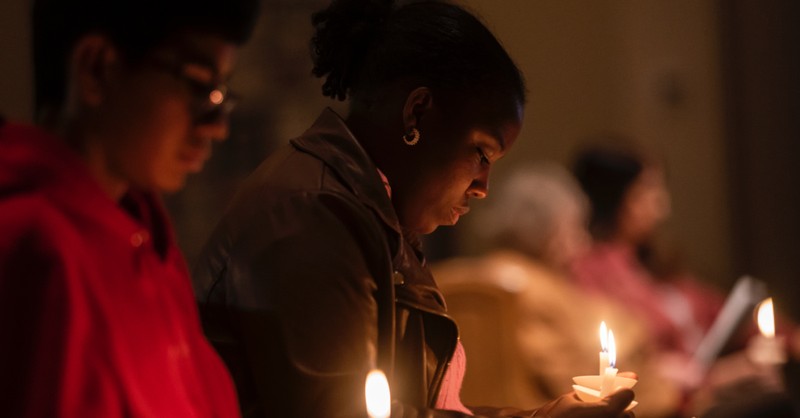
Christians – sometimes even non-Christians – frequently consult the Psalms when they are discouraged, sad, or afraid. There is a lot of comfort in those pages for women, despite the fact that men wrote the Psalms. Yet, we know that the real, divine writer of Psalms was God and it is his direction, encouragement, and love which emanates from every verse.
Some of the most common reasons women feel afraid or discouraged include loneliness, inadequacy, and vulnerability. They are afraid for their safety and the safety of their loved ones. Women often feel overlooked, unseen, and underappreciated at work and in the home. Here then are four ways women can find encouragement in the Psalms.
Photo credit: ©Getty Images/RyanJLane

1. God Welcomes Honest Lament
The truth is, bad things happen and bad things are going to happen. While some women grew up believing they had to push their feelings inside and pretend everything is alright, this is not biblical. There is a difference between self-control and denial.
Much of the Psalms arises out of the writer’s honest lament. Mark Vroegop writes “Instead of giving God the silent treatment, falling into either despair (‘I can’t do this’) or denial (‘everything’s fine’), lament encourages us to talk to God about our struggles so that we can reaffirm our trust in him. Simply stated, lament is a prayer in pain that leads to trust.”
“My eye wastes away because of grief; it grows weak because of all my foes. Depart from me, all you workers of evil, for the Lord has heard the sound of my weeping” (Psalm 6:7-8).
The Lord has created a space for us to see that lament is a normal and expected part of our conversation with him as women, whether we are grieving the loss of a child or a spouse; infertility or menopause; job loss, children leaving home, the end of a marriage, conflict with friends, or a diagnosis.
God invites lament. “Even if it’s messy or awkward, lamenting is better than faking it or not talking to him.” He wants us to tell him, not so that he can make everything okay or cause us to stop feeling what we feel, but to come alongside us in the midst of that pain. Ultimately, he wants us to be encouraged by his trustworthiness. “Laments are not cul-de-sacs of sorrow, but conduits for renewed faith.”
Photo credit: Unsplash/Christian Fregnan

2. God Cares about Our Safety
Lindsey Holcomb asserts that “Jesus’s heart for women, children, the poor, the oppressed, and the suffering reflects the heart of God for the poor and the powerless that we find throughout the Old Testament.” There are many commands in the Bible to look after those most vulnerable members of society. And as statistics tell us, those are generally women, especially (as Holcomb points out), young girls.
“O Lord, you hear the desire of the afflicted; you will strengthen their heart; you will incline your ear to do justice to the fatherless and the oppressed, so that man who is of the earth may strike terror no more” (Psalm 10:17-18).
How do we know that the male Psalmist’s assertion is true for women also? That God cares for women as well as men, in spite of the evidence that women are the most frequent victims of abuse and crime of all kinds? Where do we see God’s attitude towards oppressed women most clearly? In the form of Jesus Christ, who showed the Lord’s Fatherly tenderness.
When Mary was pouring oil on Jesus prior to his crucifixion, and the male witnesses rebuked her, he declared “Why are you bothering this woman? She has done a beautiful thing to me” (Matthew 26:10). He called the woman with the 12-year-bleed “daughter” (Mark 5:34), restoring her to a place of significance and protection by gathering her into his own family.
The Psalms encourage women to see that the Lord rescues the oppressed, not only for her own sake, but also for himself. “Redeem me from man’s oppression, that I may keep your precepts” (Psalm 119:134). Women are called to trust and hide in the Father’s love in order to proclaim his goodness; rescue from oppression gives us a purpose, which is to praise and glorify the Father.
Photo credit: ©Getty Images/Nathan Howard/Stringer

3. When We Feel Unseen
Christ followers are called to work for others without seeking acclaim for ourselves, but instead for the glory of God. But there are times when our service, as women, is neglected, overlooked and ignored. Not only is there no thanks for our many efforts, but sometimes worse: an oppressive silence, the kind which seeks to rub a person out. It is the silence that says “you do not matter.”
David declares to us in Psalm 31:7 “I will rejoice and be glad in your steadfast love, because you have seen my affliction; you have known the distress of my soul.” God sees when someone is trying to wipe us out. He also sees when we are feeling ignored and unappreciated. He sees the oppressor and claims the right to enact discipline. He sees the oppressed and gives that person (whether male or female) an identity as his own.
But his “seeing” leads to something greater than a sense of self-worth. Sharon Hodde Miller explains: “The me-centered gospel cannot give us the freedom we crave. It simply enlarges our burdens and shrinks our faith. That’s why God calls us [...] to live for him, instead of ourselves.” As we saw above, when oppressed women rise up for the Lord’s sake, all of our encouragement from the Lord should lead us not to a sense of vindication, but to the Lord’s glory. “Love the Lord, all you his saints!” (Psalm 31:23).
This is where women will always find their worth, when they keep their eyes fixed on his worthiness. Not only do we trust him more when we see how great and reliable he is; but we remember that our own worth is tied up in his, and the Psalms help us to see the unshakeable power and love of our Lord.
Photo credit: ©Getty Images/geargodz

4. God Is Unshakeable
“Forever, O Lord, your word is firmly fixed in the heavens” (Psalm 119:89).
The Lord’s immutability is good news for women claiming comfort and encouragement, and the Psalms remind us of this truth multiple times (Ps. 33:11, Ps. 18:2, Ps. 102:27, just to name a few more).
So much in life is unpredictable, ourselves included. The female body is broken by childbirth, not to mention the regular toil of a job and effects of aging. Children move on to school or marriage, leaving an empty nest. Friends get married and either move away or start doing things in pairs, causing the single friend to feel left out. The care of aging parents is an honor and a heavy burden, especially if a woman is simultaneously wrestling with a diagnosis, the breakdown of a marriage, or just the general fatigue of getting older. Retirement brings with it a longing for renewed purpose, although as we have seen above, God always has a purpose for his people: to praise him and share him with others.
When faced with distressing adjustments, or even good change (like marriage, becoming a parent, or getting a new job), we need a foundation. When all the adjustments of life make us feel as though we are standing on a moving floor in an airport, we yearn for something – or someone – that does not change; an anchor.
“God is never the subject of external forces” (James 1:17). Circumstances don’t dictate who he is or what he does. Everything God does is determined by his immutable will. His reaction (if we can call it that) to events is always the expression of his immutable character,” says Lucky Mogakane.
Why is this good news for women? Because the God who said Christ’s blood was sufficient payment for our sins, and that we are saved by our faith in his salvific work, will not change his mind. It means that the God who said we are called sons and daughters (Romans 8:16) will not disown us. People will leave us, we will become bent with age, we will sin and cause pain to others, but when we confess and repent, God is gracious to forgive (1 John 1:9).
A woman in Christ can trust that even if someone in her life holds a grudge or fails to do the right thing by her, God will forgive, he will remain, and he will love her in and through his unchanging, immeasurable power and grace.
Photo credit: ©Getty Images/kevron2001

5. God Tells the Truth
“The sum of your word is truth, and every one of your righteous rules endures forever” (Psalm 119:160).
Be encouraged, as the Psalmist is encouraged, to know that God does not lie about his nature. That includes all the beautiful things he says about you and also the discipline he provides. We know that false kindness does not sit well, especially since it makes even the genuine compliment sound disingenuous. How do you know the truth from the lies when someone only tells you good things and not bad? We need the bad news to understand just how good the good news really is.
We can become so fixated, as women, on a sense of victimhood, as though men are to be generally reviled, that we forget how sinful we are. But we need to recognize that the truth stated above about God’s discipline applies to us because we also need his grace and mercy. In the wake of oppression, we often respond sinfully.
We do not want to be rebuked, but we also need discipline sometimes. And when God is kind enough through his Word to tell us how we have wandered from him, we can also be encouraged that he will not turn his face from us. “He will not always chide, nor will he keep his anger forever. He does not deal with us according to our sins, nor repay us according to our iniquities” (Psalm 103:9-10).
Let the Psalms Draw You Closer to the Lord
Much of what the Psalms has to say about women’s relationship with God is also true of his relationship with men. While David in particular betrays his lack of respect for women (think of Tamar and Bathsheba), we see in the life of Christ most clearly how the promises of David’s Psalms are perfectly fleshed out.
What the Psalms say about God’s character (and remember, the Psalms are ultimately God’s words), Christ revealed. When we doubt that God meant those words for girls and women, we need only remember Jesus’ many respectful, loving, and truthful interactions with ordinary women who were, by cultural definition, on the margins of society. Christ saw them, sometimes rebuked them, but always drew them into a closer relationship with the Father.
Photo credit: ©Getty Images/Daniela Jovanovska-Hristovska
Originally published Friday, 11 July 2025.




